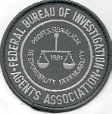
Collecting insignia from the Federal Bureau of Investigation since 1999.
This site is not officially sanctioned by the Department of Justice, The Federal Bureau of Investigation, The Louisville Metro Police Department, or any of their entities.
© Copyright 1999-2006. All Rights Reserved.
In the late 1960’s and early 1970’s The U.S. Government saw many different organizations arise to protest the war in Vietnam. Most of these organizations promoted peaceful protests, however a few resorted to violent, criminal acts to make their views more public. One of these groups came to be known as “The Weathermen”. This group protested government policies through a series of criminal acts including bank robberies, burglaries and bombings of Government offices, ultimately leading to the bombing of the United States Capitol.
The FBI was directed by the President to locate and apprehend the members of this group. Since this group was known to have conspired with hostile foreign governments to commit these acts, the FBI deemed that the more liberal National Security Guidelines took effect and authorized wiretaps and warrantless entries into locations where members of the Weathermen were believed to be hiding.
About this same time, the Nixon tenure came under fire for the Watergate scandal, which led to members of Congress to begin more closely scrutinizing the activities of other government agencies. This included the FBI and the Weathermen investigation. Soon, agents were being deemed as “renegades” by Congressional members and were compelled to testify before federal grand juries as to their actions. Fearing embarrassment, FBI Headquarters did not initially acknowledge that it had approved the use of these techniques in this investigation, and field agents were unable to retain legal counsel to protect themselves from the consequences of having done their jobs as instructed. This ultimately led to the indictment of a supervisor from the New York Office who had led the Weathermen investigation on civil rights violations.
Agents across the country knew that the supervisor’s activities had been endorsed by FBIHQ, and they began organizing to raise funds for the legal defense of their colleague as well as to rally support from others across the nation.
Eventually a group of New York Agents uncovered documents in FBI Files that proved that the supervisor had acted under the full knowledge and authority of the director of the FBI, forcing FBIHQ to ask for a dismissal of the indictment.
From this experience, agents banded together to form the FBI Agent’s Association for not only times of crisis, but on a continual basis. The Association is now sought upon for advice by the FBI Director, members of Congress, and the media.
Source: FBI Agent’s Association
